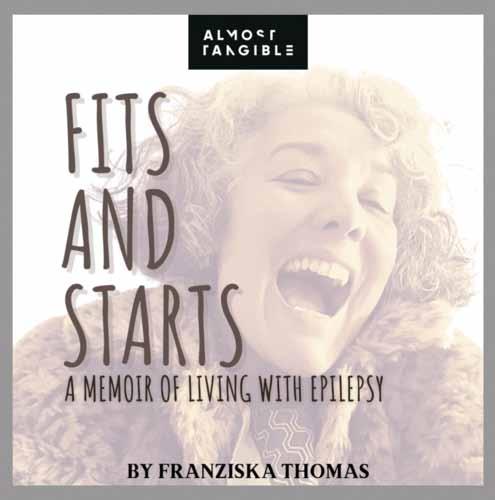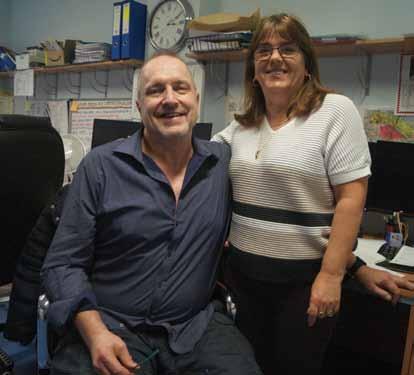
8 minute read
day
‘searingly honest’ : life with 30 epileptic seizures a day
ExClusivE
Advertisement
By Kit Heren
kit@southwarknews.co.uk
Franziska Thomas, the author of Fits and Starts, a memoir about life with epilepsy, delivers these words surprisingly cheerfully. An East Dulwich native who still lives in the area with her husband and two sons, Franziska has now turned the book into an immersive audiobook - including sections she narrated herself in the moments after a seizure. She says that despite writing the book and recording her sections being tough, "when I start doing something, I refuse to give up."
“There’s loads of people out there with epilepsy who can’t hold a book,” Franziska adds. “After you’ve had a seizure you just want to lie down and chill out - if you’ve got the thing on your phone you can just listen.”
Franziska is seriously affected by her epilepsy: she has as many as 30 smaller seizures every day, as well as ‘tonicclonic’ seizures - the bigger episodes that most people recognise as an epileptic fit. She also normally has about fifteen seizures every night, meaning her sleep is constantly interrupted and she usually wakes up exhausted - “like being on a running machine”.
Her injuries from falling include a fractured skull, broken ribs and a cut that meant she needed 70 stitches across her chin.
“Because of all that we live life on a dayby-day basis,” she says. “We kind of have a completely different life to everyone else. We can’t plan for things like half-term, we just have to do things when we can.”
Franziska has to take a lot of medication to control her condition. “I take five different anti-convulsants. 70 pills a day - it’s like a full-time job. I have all these reminders on my phone. I’ve been told ‘turn off your bloody alarm!’ - but it keeps me alive!” She had her first fit when she was fifteen but says she didn’t fully come to terms with her condition until her midtwenties - even going through years of university without telling anyone that she was epileptic.
Franziska, who did work experience at the News, found work at the Guardian but left despite getting a prestigious fulltime job at the publication. She “cried for two weeks” after quitting but soon found work as a teacher, a job she says she loved.
She worked at the tough North Westminster Community School for seven years (now closed and merged with another school to become Westminster Academy.) Franziska says that the vulnerability her condition gave her made it easier to bond with the children, many of whom came from very difficult backgrounds. “Having fits put me on their level, because they could see a frailty in me. I was so open about it, I didn’t hide anything. They thought ‘if she’s going to be open about it there’s no reason for us to hide anything. I was much more aware of things than other teachers were. I was much more aware of things when things went wrong, I became really astute to little things.
“That empathy comes from understanding stuff because you have a chronic illness and you can see really small behaviour changes. These kids trust you implicitly.”
A group of students even saved up and bought Franziska a pillow to carry around the school so there would be something to put under her head if she had a fit. “One of them told me: ‘It’s only because I don’t want to put my coat under your head when you fall over,’” she jokes.
Franziska’s decision to be so open about her condition was also spurred by the arrival of her two sons, Oskar and Kurt, now aged 14 and 11. “I needed to know that if I had a fit when I was out, there would be someone to hold my children. I never went into big places like Sainsbury’s, I only went into small shops where I knew Oskar and Kurt would be safe. There are so many things that people take for granted. It’s very, very different.”
Oskar and Kurt’s upbringings have been shaped by their mother’s condition, she says. “They have to think about things like ‘Mummy’s fallen over again’. ‘She’s on the floor again’. ‘Can you take off her jewellery again?’
“On the other hand, we have a house which is very empathetic and open. We have extraordinarily loving and generous children.”
Sadly, Oskar and Kurt have sometimes had to defend Franziska when she is having a fit in public or showing other effects of her condition. One of the side effects of her medication is ataxia, a condition that makes it hard to stand up straight.
“A couple of weeks ago, someone in the street told me I shouldn’t have children. Sometimes because of my ataxia I literally just fall down - you look like you’re drunk. This woman told me ‘drunks shouldn’t have kids’. My youngest son was helping me along and telling me ‘you’re almost home’.
“You don’t even know the situation, it’s so unnecessary. The next thing I did was even worse because I threw up everywhere [because of the medication].
Another time earlier this year, Franziska fell over in the street. “There was a man who was recording it on his phone saying ‘this is going to look great on my YouTube channel.’ And Oskar chased after him saying ‘don’t you dare put that on YouTube, that’s my mother.’” Franziska has also had many “lovely” experiences in East Dulwich, including when she collapsed in M&S and a stranger walked her home and carried her shopping.
Franziska says she thinks of her book and the audiobook version as a public service.
“If I can survive epilepsy, then anyone else can as well. There’s no reason that anyone else can’t do it. I’ve had so many messages thanking me since the book came out, and it was really important to realise that I don’t even have the worst epilepsy. Some people have 30 fits an hour.
“I wouldn’t choose epilepsy, but we have to make the most of it.”
The audiobook is the result of a local collaboration: production company Almost Tangible was founded by Sydenham resident Charlotte Melén.
Fits And Starts: A Memoir of Living with Epilepsy is available on commercial audiobook platforms or free via the Royal National Institute of the Blind and Listening Books for people with sight impairments or other health issues that affect their ability to read.
It is also available on Amazon.
Author Franziska Thomas
Fond farewell held for popular Bermondsey GP

By Kit Heren
kit@southwarknews.co.uk
dozens of patients and staff queued up last week to thank a "one of a kind" Bermondsey doctor who is retiring after twenty years in the neighbourhood.
Dr Alan Campion of the New Mill Street Surgery is leaving to move to Spain, leaving behind many admiring patients who lined up out the door of the surgery on Wolseley Street to say thank you and goodbye last Thursday (September 30). Over tea and cake Dr Campion, who ran the surgery on his own for much of his tenure, thanked patients and staff, adding that "it's been an honour and a privilege these last twenty years to know you all."
But he left with a warning about the future of the NHS, saying: "Bear in mind that it is becoming increasingly difficult to find doctors and nurses and we have been blessed over the years with some very good locums. "Committing to an area, and when you know you’re going to be in that area for twenty years, it’s not just two bottoms on a seat over a table, it’s more than that. Reflecting on the role of the GP Dr Campion said: "Primary care - I always wanted it to be that. It has its positives and its drawbacks. I’m reminded of [former US president] JFK’s thing on his table - the buck stops here. "Because you have to know about the baby clinic, you have to know about the vaccination schedules, you have to know a little bit about everything. To be a generalist is, in many ways, a specialism that seems to be taking a battering again." Dr Campion added that he had moved to the surgery in the years following the rise to power of Tony Blair's New Labour - hence the name 'New Mill Street'. He ended his speech to staff and patients with a reflection on the state of the NHS, adapting the end of Blair's final speech to the House of Commons. "Although there’s a little bit of skulduggery going on it is really quite the most marvellous institution and full of high ideals. To all my friends and foes I wish them well, and that is that, the end." Dr Campion, originally from Derby, later told the News that he first got to know Bermondsey because "somebody would show him the smells that would come out of the walls of the wharves. It was fascinating... the next twenty years just seemed to roll by."
He praised the diversity, the warmness and "real sense of community" of the area. Speaking outside, several of Dr Campion's patients praised him, with one saying: "He's one of a kind. To be here for twenty years and totally devote himself to the community - it's just amazing."
The New Mill Street Surgery was rated as 'good' in the most recent report by the Care Quality Commission, but was previously called 'inadequate' after a 2017 inspection. The surgery, which is also served by Dr Amrit Dugala, will still be taking patients after Dr Campion's departure.



